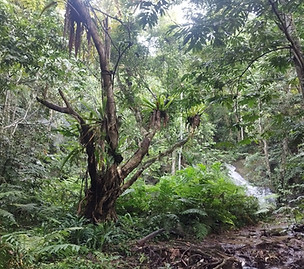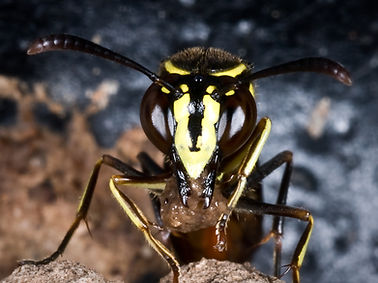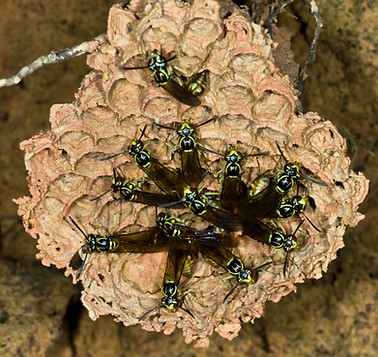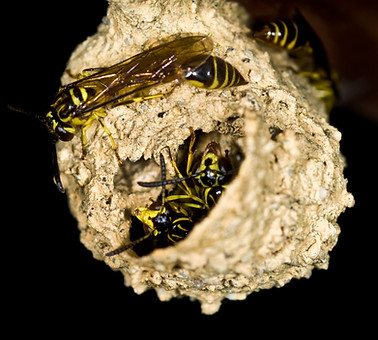
The focus of our research lab is the behaviour, cognition and ecology of social insects, particularly bees and wasps. We are interested in understanding their cognitive abilities and inner mental lives, exploring how these insects perceive the environment and interact with both it and their conspecifics. Our research also investigates their foraging strategies and other interactions with plants. In addition, we examine the impacts of anthropogenic stressors—such as microplastics, pesticides, and climate change—on their cognition, behaviour, and ecological functions.



01
Cognition and Internal States
Despite their miniature brains, social insects such as bees and wasps exhibit remarkably advanced cognitive abilities. Beyond complex learning and memory, they demonstrate social learning, mental representation, and self-control - traits once thought to be unique to vertebrates. For example, bees can solve relational tasks (e.g., identifying what is the same or different, or what is above or below) and perform simple arithmetic. Our lab investigates how these insects acquire, integrate, and flexibly use information to guide adaptive decision-making. A central focus of our research is the influence of internal states, such as motivation, attention, and emotion-like processes, on behaviour. The study of emotion primitives represents a major, independent line of inquiry within the lab. We also investigate whether insects experience pain by studying their behavioural and neurobiological responses to noxious stimuli, using pharmacological methods targeting neurotransmitters like GABA to reveal how nociceptive behaviours are regulated at the central level. Our research on these and other topics is inherently multidisciplinary, combining behavioural protocols with analyses of biogenic amines, neuropeptides, and neurohormones. These molecules are quantified using advanced mass spectrometry techniques (GC-MS, HPLC-MS, and MALDI-TOF MS), enabling us to link behavioural outcomes directly to molecular changes in the brain and haemolymph. By integrating behavioural and molecular data, we aim to deepen our understanding of how small-brained animals produce flexible, state-dependent behaviours, thereby contributing valuable insights to the broader discourse on invertebrate cognition and phenomenological experience.
02
Plant–Pollinator Interactions
Floral attractiveness and pollinator fidelity are key to the evolutionary success of flowering plants and their pollinators. Striking floral displays and the efficient foraging behaviour of pollinators have reinforced this mutualism. Flowers use a wide range of traits, such as colour, shape, and scent, often adapted to the sensory and physical characteristics of their target pollinators. To encourage repeated visits, they offer nectar and pollen rich in sugars, amino acids, proteins, lipids, and minerals. Nectar also contains a variety of secondary metabolites, including alkaloids, phenolics, and terpenes. Although these compounds are often associated with plant defence, growing evidence suggests that some can influence pollinator behaviour in more subtle and adaptive ways. For example, at natural concentrations, substances like caffeine and nicotine have been shown to enhance pollinators’ learning and memory, potentially guiding their foraging decisions and increasing flower constancy. Alongside these well-known compounds, nectar also contains non-protein amino acids (NPAAs), such as GABA, β-alanine and taurine which are increasingly recognized for their potential roles in shaping pollinator cognition. Rather than deterring visitors, these substances may modulate neural processes related to learning and memory, influencing the dynamics of plant–pollinator interactions. Our lab is especially interested in how such compounds affect the neural and behavioural processes involved in pollinator cognition and decision-making.
.jpg)




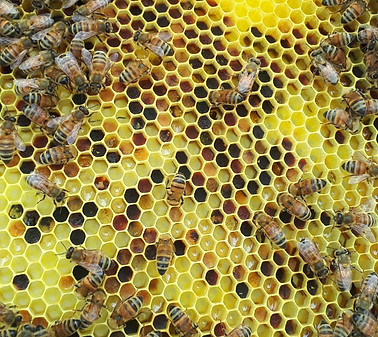
03
Bee Health and Environmental Stressors
Pollinators, both managed and wild, are increasingly affected by anthropogenic stressors, particularly chemical pollutants. Among the most concerning are pesticides, which, even at sublethal, field-realistic doses, can impair learning, memory, and foraging behaviour. Yet, current risk assessment protocols remain outdated, focusing primarily on acute lethality while neglecting chronic, behavioural, and cognitive effects that are crucial for pollinator survival and ecosystem functioning. Our lab actively addresses these gaps by investigating the neuroethological impacts of both synthetic and biopesticides—the latter increasingly used in organic agriculture, yet often wrongly assumed to be harmless to beneficial insects. Our research has shown that such compounds can disrupt cognitive functions, alter motivational states, and affect social behaviour in non-target species like honey bees, bumblebees, and paper wasps—revealing subtle but significant effects on social organization and colony dynamics. We are also among the first to investigate the effects of microplastics (MPs) on pollinators—an emerging concern in terrestrial ecosystems. Our recent studies show that ingested MPs impair sensory processing, learning, and motivation in bees. These disruptions manifest not only at the individual level, but also at the colony scale, where additive or synergistic effects of different plastic polymers can reduce collective performance and resilience. Moreover, we have detected plastic particles accumulating in the brain within days, raising critical questions about their long-term neurotoxicity. Our overarching goal is to advance a more realistic and mechanistic understanding of how emerging environmental stressors compromise pollinator cognition and health, ultimately informing more effective risk assessment frameworks and sustainable agroecological practices.
04
Social Biology of Tropical wasps
Hover wasps (family: Vespidae; subfamily: Stenogastrinae) are a remarkable group of primitively eusocial wasps found across Southeast Asia. With fewer than one hundred known species in seven genera, they exhibit a remarkably variety of social organisations and nest architectures, ranging from small, facultative groups consisting of a single female and one or two helping daughters and a few offspring, to more intricate cooperative societies. As the most basal lineage of social wasps, the Stenogastrinae subfamily plays a unique and pivotal role in our understanding of the evolution of eusociality within the Vespidae family.
Our laboratory builds upon the pioneering work of Leo Pardi, the founder of Italian ethology, and Professor Stefano Turillazzi, one of the world's leading experts on this group of insects. Through fieldwork in the Malaysian rainforests of Pahang and Selangor, and occasionally in Borneo, in collaboration with the University of Malaya, we investigate multiple facets of Stenogastrinae biology. Our research focuses on their visual and chemical communication systems, natural history and the evolution of brain architecture in response to social complexity. Our expeditions frequently result in the discovery and formal scientific description of new species of Stenogastrinae, thereby further enriching our understanding of this key group in the study of the evolution of social behaviour.
